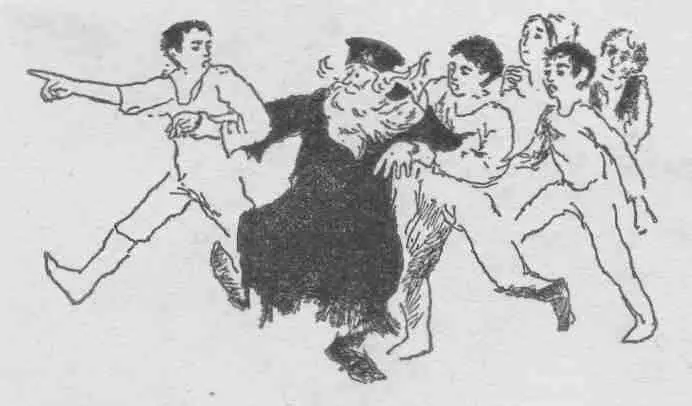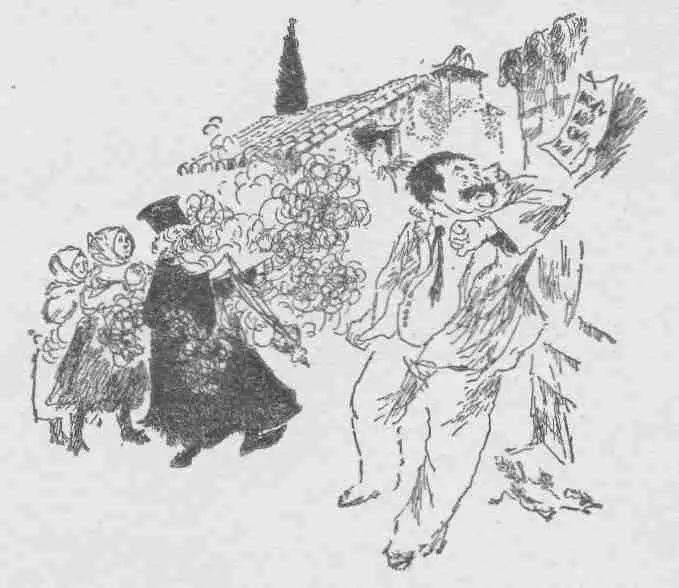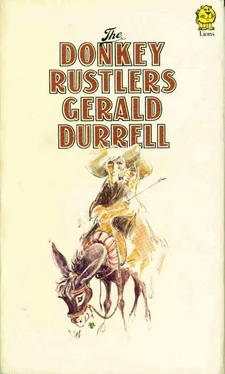“Undoubtedly witchcraft,” said Papa Yorgo. “This is where we need the help of the church. Go and wake up Father Nicodemus.”
Father Nicodemus never got out of bed much before twelve o’clock and led a fairly blameless existence. He had spent seventy-five years in the Greek Orthodox Church without having done anything more strenuous than comb his beard and sip the odd ouzo. Now here he was, being hauled out of bed ignominiously, and being forced to give spiritual advice to his parishioners at what amounted, as far as he was concerned, to dawn. By the time the situation had been explained to him by the villagers his head was aching so much that he was forced to have a glass of wine, although it was so early in the morning.

“What can we do?” asked Papa Yorgo.
“Exorcise,” shouted a voice from the crowd.
“What are you going to exorcise?” inquired Papa Yorgo. “The donkeys have gone.”
“But if we exorcise the place where they were,” said Mama Agathi. shrilly, “then maybe Vyraclos will bring them back.”
Father Nicodemus could not help feeling that there was a flaw somewhere in Mama Agathi’s logic, but he could not put his finger on it.
“I am not altogether sure,” he said, “how one does exorcise.”
“You are a priest, aren’t you?” asked Papa Nikos, who had returned from a fruitless endeavour to find his own donkeys. “You should know how to exorcise.”
“I think,” said Father Nicodemus, prevaricating wildly, “I think I have it written down somewhere.”
He tottered back to his house and returned with two impressive sheets of paper, one of which was a peroration which he normally gave on saints’ days, and the other was a list of groceries which he wanted from Melissa, but the villagers were not to know this.
Never in his whole career had he spent such an exhausting two hours. With a candle and incense he was forced to exorcise each and every stable or the place where the donkeys had been tethered. It was not until they reached the Mayor’s house that they became aware of the fact that the Mayor, who was also used to sleeping late, was unaware of the catastrophe that had overtaken the village. As soon as he was apprised of the facts, he rushed round to his own stable and there, to his horror, he found that his donkeys and his horse had been taken as well. Father Nicodemus was in full swing with the incense when the Mayor discovered the notice saying DONKEYS OF THE WORLD UNITE.

“Communists,” gasped Mayor Oizus, growing pale. “It’s Communists.” He tore down the notice and read it out in a trembling voice to the villagers.
“We must have a meeting of the council immediately,” he said.
The council of four, with the Mayor as Chairman, met in the village square and the entire population of Kalanero gathered round to listen to their deliberations and interfere in a helpful sort of way.
“I’m sure it’s witchcraft,” said Papa Nikos. “I remember hearing about a very similar case in Cephalonia many years ago.”
“Don’t be foolish,” said the Mayor, pointing at the notice which he had put on the table in front of him. “It’s obviously Communists. Who else would ask donkeys to unite! In any case, it’s a well-known thing that Vyraclos can’t write.”
“That’s very true, very true,” said Father Nicodemus, who could see that if he did not steer the villagers away from the witchcraft theory he was going to have a very hectic time from then on.
“Yes,” agreed Papa Yorgo, “it is indeed well known that Vyraclos can’t write, so therefore I suppose it must be Communists.”
“But why would they do it!” queried the Mayor plaintively. “Why would they take our donkeys?”
They sat and mused on this baffling problem for some moments.
“It must be a plot,” said Papa Nikos suddenly. “It’s a plot to undermine the agriculture of the village.”
“How do you mean!” asked the Mayor, mystified.
“It’s obvious, isn’t it?” asked Papa Nikos. “Without our donkeys, we can’t gather our food and therefore we are ruined. It’s a typical Communist plot.”
“I’m sure he’s right,” agreed Father Nicodemus.
“It’s possible,” said the Mayor doubtfully. “It’s possible, I suppose.”
“Maybe it’s not just this village,” said Papa Yorgo. “Maybe they’ve done it to every village in the island in order to undermine the economy of Melissa. It’s a well-known fact that Communists do dastardly deeds like this.”
Even the Mayor was a bit shaken at the thought of every donkey in the whole island of Melissa being spirited away by the Communists.
“Well, what are we going to do!” said Papa Nikos.
“Yes, yes,” clamoured the villagers. “What are we going to do?”
The Mayor looked round him helplessly. Never during his term of office had he been faced with such a problem.
“You’re the Mayor,” said Papa Nikos. “You think of something.”
The Mayor knew that he had never been particularly popular and, in fact, had only been elected to office because all four members of the council owed him money. He could see that by now the villagers, panic-stricken, were working themselves into an ugly mood and he sweated more than he had ever sweated in his life before.
“Where,” he asked, “is Menelous Stafili?”
“In bed,” said Papa Nikos, surprised that the Mayor should not have realised this.
“Well, go and get him,” said the Mayor. “This is obviously a case for the law.”
Presently Menelous Stafili shambled into the square doing up the buttons on his uniform and rubbing the sleep from his eyes. The whole dreadful plot was explained to him by the Mayor, four council members and two hundred villagers. When he had grasped the essentials, which took some time for he was never at his brightest at that hour of the morning, Menelous Stafili looked at the Mayor.
“Well, Mr Mayor, what do you intend to do?” he asked.
“You lunatic,” snarled the Mayor, going red in the face. “What do you think I got you out of bed for? You’re the policeman. It’s up to you to suggest something.”
Menelous Stafili scratched his head. He had never received promotion, for the simple reason that he had never succeeded in arresting anybody. Apart from that, crime in Kalanero was not exactly on a grand scale. Now, faced with this major felony, Menelous Stafili felt exactly as the Mayor did.
“I suppose,” he said at last, “that we ought to send a telegram to Athens.”
“Fool!” roared Papa Nikos. “What do you think Athens can do?”
“It would be more to the point,” said the Mayor. “if the matter was reported to the Chief of Police in Melissa. It’s well known that Prometheous Steropes is a man of most astute mind.”
“Quite right,” agreed Papa Nikos. “I agree with you entirely. I think that Menelous Stafili as representative of the law in our village, and you as our Mayor, ought to go personally and report the matter to him.”
“Certainly,” said the Mayor, and smiled a smug smile of satisfaction.
“But how are we going to get there?” asked Menelous Stafili. “We haven’t anything to ride on.”
The look of smug satisfaction on the Mayor’s face disappeared in an instant.
“I would suggest, then,” he said hurriedly, “that Menelous Stafili goes on foot and then reports back to us.”
“No,” said Papa Nikos grimly, “I think you both ought to go on foot and then report back to us.”
Читать дальше












